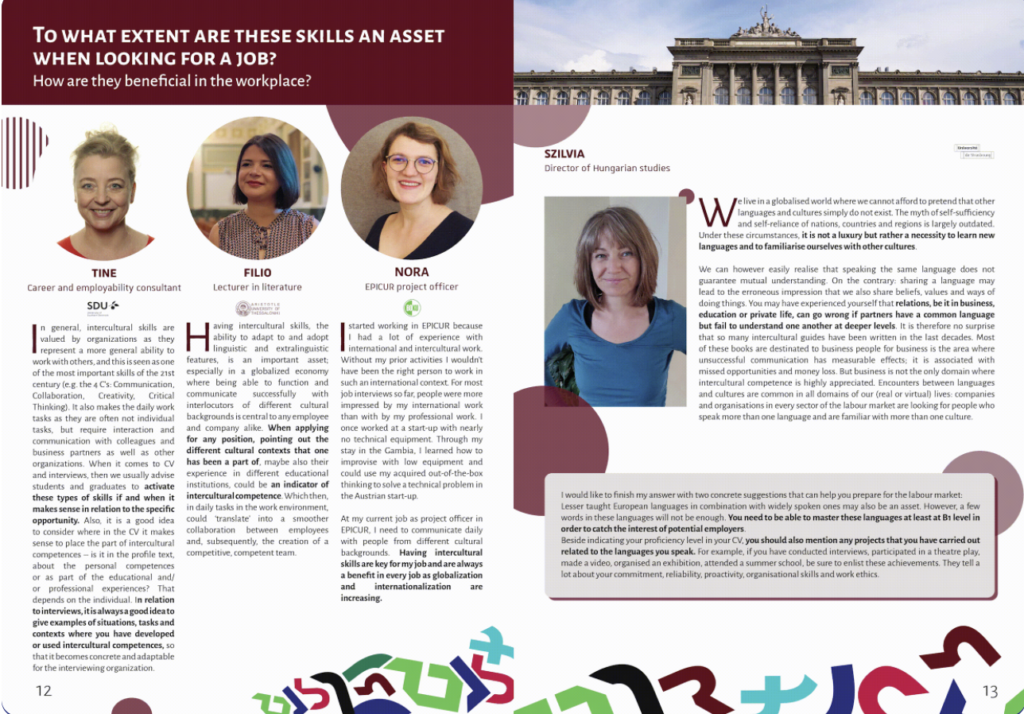Intercultural skills
Keen to know how to promote language learning among its students, EPICUR conducted in spring 2021 an alliance-wide survey to understand the incentives of its students to learn a new language. The results showed that the main motivation is the job opportunities knowing languages provides.
EPICUR believes that learning new languages goes hand in hand with developing intercultural competences. Through EPICUR, students and staff have the opportunity to study and to work in an international, multilingual and multicultural environment. This allows them to not only develop and perfect their language proficiency but also their intercultural skills on a daily basis. These competences are highly valued on the job market and provide students with increased job opportunities.
Video & booklet
In order to raise awareness of the link between language learning, development of intercultural skills and employability, EPICUR interviewed students, alumni, staff and professionals from its respective regions to collect their views on the topic. Check out all our video tesimonies around the following three questions:
What are intercultural competences?
CAMILLE
Educational coordinator | UHA
“Intercultural competences, in my opinion, are competences that everyone should acquire in their life and for their professional life. We all develop our own intercultural competences: for me it would be for example the ability to adapt to a new context, but there are many others.”
SIMONETTA
Student in plurilingualism | UNISTRA
“In my opinion, intercultural competences are aptitudes to communicate successfully with other individuals, who are from different cultural backgrounds. These skills depend on what I would call internal factors, such as the cultural background and cultural influences that the individual has encountered throughout his life. For example, it happens that people are exposed to a multicultural family, so they acquire this competence from childhood.”
TESSA
Central student council member | UvA
“I think having intercultural competences means being knowledgeable about other cultures and being able to understand them. This also entails being able to get into an exchange with other cultures, so communicating with people coming from different backgrounds and from different parts of the world.”
CHARLÈNE
Educational consultant | UNISTRA
“In my opinion, intercultural competences are the ability to connect with people who have different cultures, different views on situations and therefore different behaviors. Thanks to a curious, observative, non-judgmental and positive approach of the other, I may have access to a better understanding of their conceptions. This will allow the creation of a common culture enriched by both of points of view.”
How does one acquire intercultural competences?
ANNA-MARIE
Student in Market & Management Anthropology | SDU
“I believe that there are a few ways to obtain intercultural competences for example by living abroad, learning a foreign language, or by meeting people from different cultures. But it is important to remember that one needs to keep an open mind while doing all these three activities.”
JOHANN
Junior professor in intercultural pedagogy | UHA
“I come from the educational sciences and I therefore start from the assumption that every human being has a whole bunch of skills and potential that he or she can exploit but often does not know how to exploit them well. […] On this basis, of who we are intrinsically, we can develop our intercultural competence and therefore adapt what we learn to our own needs, which is why we don’t necessarily need the same things at the same time.”
LILOU
Student in international communication | UNISTRA
“Growing up in an intercultural environment helps. For example I grew up in a German-French family, and it teaches you very early to go out of your comfort zone and live with different traditions and lifestyles at the same time. Of course you can also learn them thanks to personal motivation by learning a new culture or a new language.”
KEN
Former member of the central student council | UvA
“I think this is a lifelong learning journey. Intercultural competences can be picked up if someone wants to. In my experience, it starts with self-acknowledgment, awareness of one’s own culture and keeping an open mind to other cultures. For those who are motivated, it is natural to be intentionally or consciously drawn to varying cultural exposures then interact and adapt to them.”
To what extent are these skills an asset when looking for a job?
LILIAN
Study career advisor | UvA
“All these skills are a big asset for organisations and teams. Especially nowadays, the labour market is changing rapidly because of automatization, technological developments or for example a global pandemic, it is important that you can adapt quickly, to be open to other perspectives, to be willing to learn new things and develop yourself, and
that you’re able to communicate in an appropriate manner and can reflect on your own doings.”
SERGIO
EPICUR Research project officer | UHA
“So I think that these skills should not be highlighted explicitly on a CV. I have intercultural competences but it’s more something that we will see through my experience, my professional, academic, personal background. The places where the person has lived. The different actions in which the person has participated. The different jobs that the person has had and where they have worked.”
KATHARINA
Communication officer | UFR
“Intercultural competences are important in today’s labour market, in a world that is becoming more and more globalized. Of course the work environments are more diverse and you work much more with other countries, and so far these skills and competences are very important for the employers. They should be in every CV, starting with stays abroad or even with foreign language skills that I think is a very important point in the CV.”
WILLOW
English teacher | KIT
“These intercultural skills can be applied in any work environment. Particularly if you happen to be working in communication, for example when you meet somebody, how do you talk to them? How do you write emails? Simply, you can learn this by observing if you’re just at a conference somewhere.”
Click on the picture below to download our booklet!




